In a January post I wrote about my trip to Downieville, in California’s Sierra Nevada foothills, to do some background research for my recently released ghost story, The Burning Ground. Some weird things occurred during my time there, and I mentioned that this wasn’t the first time I had strange experiences while researching a book. Here are some more.
My novel, Fire Dance, is another ghost story that takes place in southern California’s Anza-Borrego Desert. I’ve gone hiking in Anza-Borrego many times, both before and since writing Fire Dance, but it was during a research trip to 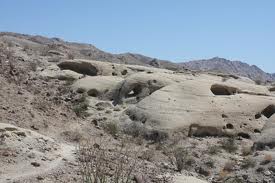 this bleak, beautiful place that something really weird happened. I had hiked out by myself a couple of miles from what little civilization exists there to a narrow canyon. Sitting atop a boulder, I enjoyed the silence that stretched forever in all directions.
this bleak, beautiful place that something really weird happened. I had hiked out by myself a couple of miles from what little civilization exists there to a narrow canyon. Sitting atop a boulder, I enjoyed the silence that stretched forever in all directions.
Suddenly, I heard a faint whistling sound, like the wind, but I did not feel any wind blowing. It grew louder, and as I looked around I saw a small dust devil—a single one—whirling amid the cacti and rocks. The sound grew louder, and the dust 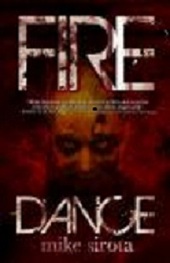 devil came closer to where I sat, but I felt more fascinated than frightened. Moments later it seemed to go through me, and again, it did not scare me. Instead, it seemed to acknowledge—and approve of—my telling this desert story. At least, that’s what ran through my mind.
devil came closer to where I sat, but I felt more fascinated than frightened. Moments later it seemed to go through me, and again, it did not scare me. Instead, it seemed to acknowledge—and approve of—my telling this desert story. At least, that’s what ran through my mind.
Seconds later, after passing through me, the sound, and the dust devil, were gone.
My 1990 horror novel, Demon Shadows (reissued by me in 2011), takes place in the high Sierras, near the neat little town of Truckee. The Thorburn party—a fictional Donner party—is stranded in the mountains during the winter of 1845-46. But unlike the Donner party—we all know how they survived—this bunch makes a deal with…well, supernatural forces, a bloody legacy that endures into the contemporary story. Now, an artists’ and writers’ colony stands on the site, operated by the descendants of the Thorburn party.
Paul Fleming is a bestselling novelist suffering from writer’s block, and he has come to the Thorburn Colony to regain his mojo. His cabin is out a ways, and he has to follow a narrow path through the creepy woods to get to the dining 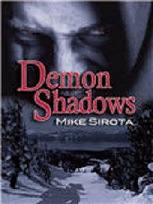 room in the main building. Here is a scene from his first night there:
room in the main building. Here is a scene from his first night there:
The trail now snaked between the pines; the creek veered off and was soon a distant sound. Paul remembered this part, where the trees pressed in against the footpath: a narrow passage, with strewn brush and leaves covering possible obstacles on the ground. The jogger must have known the way well to have passed through so quickly.
One of the lights had gone out. For a short distance Paul could barely see a thing. He stumbled once over a rock wedged in the ground, caught himself, and went on. The path curved sharply ahead. He could see a faint glow from the next light.
He heard a sound and froze, listened. Rushing water, as in Leanna Creek. But the tributary was too far away. Still, that was what it sounded like… No, different now. A continuous sound, as of something coarse slowly brushing against…what? Not from one direction or another, but everywhere around him.
“Someone there?” he called, turning in a circle.
It stopped, the ensuing stillness almost as unnerving as what had come before it. Paul waited a few moments then started off, shaking his head.
Okay, creepy…but what did Paul hear? I had no idea. So I made it an animal, and by the second draft it remained an animal, which to me was a cheap scare, like a black cat leaping and yowling in front of someone in a horror movie.
Then, I traveled to Truckee and Donner Lake in the dead of winter, when the story takes place. I drove a few miles north of Truckee, where I visualized the Thorburn Colony to stand. I followed a deserted dirt road out as far as I could drive, until mounds of snow blocked the way. Getting out of the car, I trudged through the snow into a dense thicket of lodgepole pines, the most ubiquitous tree in that area. With the snow nearly up to my waist, I stopped. For a few seconds the incredible silence of this place overwhelmed me.
Then, I heard a sound.
A weird sound, unlike anything I’d ever heard. I looked around but could not spot a source. It grew louder, and my horror writer’s brain went into overdrive, conjuring up something that might emerge from the trees and eat my liver. I started backing up toward the car. The sound grew even louder. That’s when I looked up and saw what Paul did the following morning:
Then he heard the sound again.
The one from last night, only this time near his cabin. Not the rushing water; that was the creek for sure. The scraping, the long, continuous…
There was a wind, not strong, but enough to make the tops of the thin, towering lodgepole pines sway like tules. They grew close together, these ubiquitous Sierra trees.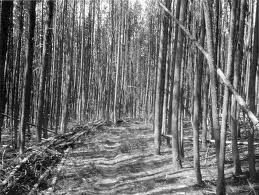
So close that they rubbed against one another.
Paul smiled and started for breakfast.
Obviously, what I experienced in that thicket made it into the book. That’s what “living research” does for one’s writing.
But that wasn’t all that happened to me up there. Seems that Mrs. Thorburn was a skilled artist, and she did a disturbing painting that hangs in the main building. Paul sees it for the first time, and is mesmerized:
There were a few freestanding columns topped by classic sculptures, and artwork in ornate frames hung on velvet-covered walls. The centerpiece: a huge portrait of a wagon train struggling along through an unrelenting assault of snow, people buried up to their waists, horses lying on their sides, defeated. The faces of the pioneers had not merely been painted, but imbued with anguish, as if the artist had known firsthand what they experienced. A 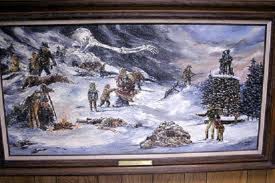 single unmarked headstone rose from the snow in the foreground. Even from the distance at which Paul viewed the work, he found it unnerving, yet fascinating.
single unmarked headstone rose from the snow in the foreground. Even from the distance at which Paul viewed the work, he found it unnerving, yet fascinating.
I made that painting up during the first draft, no research or anything. Okay, so I’m exploring Donner Lake one afternoon, trying to “feel the ghosts” of that terrible incident, but for some reason my usually sensitive mojo is not working. Disappointed, I walk into the small Donner Museum, and toward the front of one room I see a number of paintings on the wall. Two of them hang side by side, and together they are a composite of Nancy Thorburn’s painting. I stand there, unable to move, for a couple of minutes, just staring at it, as Paul does a number of times later in the story.
Subsequently I sent photos of these paintings to Bantam, my publisher, as guidelines for the cover art. They stuck a pentagram on, which had nothing to do with the story, but otherwise they did okay with it.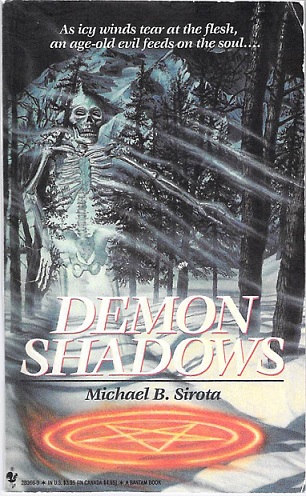
That particular research trip, over two decades ago, remains indelibly etched in my brain. Weird happenings? Bring ’em on!
